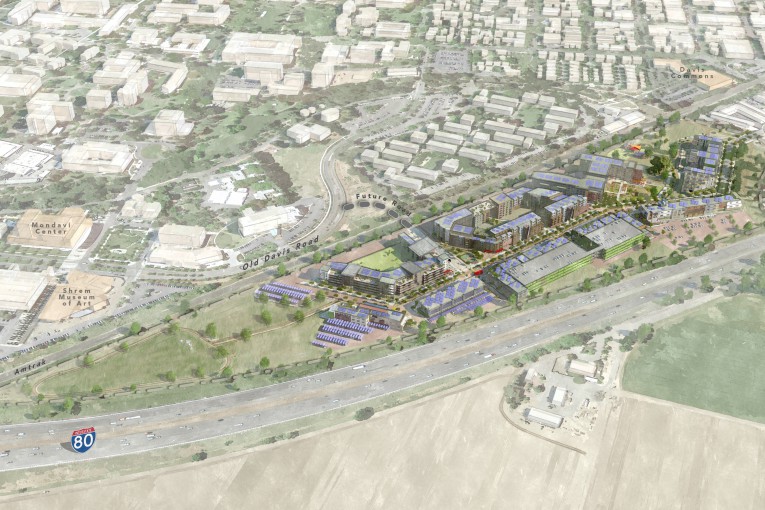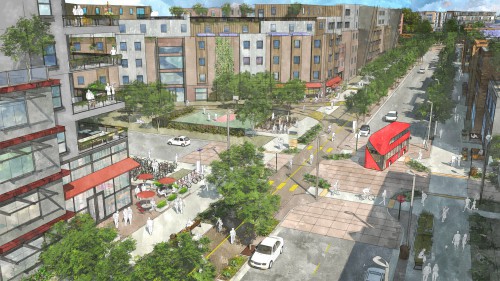

As the calendar turns to 2016, it appears that the heat is about to turn up as well on a number of campaigns. On Friday, we received a pitch from former Councilmembers Debbie Nichols Poulos and Stephen Souza on Nishi.
They write, “For years now, we’ve watched as the Nishi Gateway project has blossomed and matured through a close working partnership between its project managers and the city, university, county, and community leaders. From Day 1, the Nishi Gateway project, a mixed use live-work space between the campus and Davis downtown, has been focused on making affordable car free living possible for its residents while infusing our local economy with millions of dollars in economic activity.”
They add, “The 325,000 square feet of flexible research and development space proposed for the Nishi site is capable of meeting the needs of a diverse set of businesses spawned from research at UC Davis, and if constructed, it will generate millions of dollars in revenue for Davis Joint Unified School District.”
It is a pitch for two things. First, they ask, “Can we count on your support for the Nishi Gateway? A critical vote by your City Council will take place in a few short days, and we want to make it clear to them that the Nishi Gateway has broad community support.” That is linked to a “take action” page on the website Davis For Nishi Gateway.
They have a second pitch as well, which links to a survey.
Here is the rest of the pitch:
Throughout a multi-year process as the details of the Nishi Gateway have been finalized in public hearings and collaborative meetings, we’ve been impressed by the passion of everyone involved to make sure that Nishi is a good fit for Davis now and into the future.
For example, while Nishi is projected to generate between $315 to $385 million in yearly economic output and create 1,500 to 1,800 permanent jobs, an earlier economic analysis suggested that Nishi would produce a small net deficit for the city’s general fund under some scenarios. The Nishi project managers responded to these concerns by ensuring that the project will generate revenue for the city’s general fund by pledging to pay for any loss in tax revenue caused by leasing portions of the site to UC Davis, by working with the county to ensure a more favorable tax sharing arrangement for the city, by taking over the city’s financial responsibility for onsite public park maintenance, and if deemed appropriate, by including an onsite hotel.
Another concern that has been raised is the importance of an access road to campus. After all, Nishi has been identified as the city’s best location for an innovation district precisely because of its close proximity to campus and its ability to transform research at UC Davis into locally-owned small businesses. We’re happy to report that the project managers have committed to only moving forward with Nishi if both access points are cleared for construction, and they’ve also committed to reducing onsite parking by an additional 10% to further encourage walking, cycling, and transit access.
Nishi is a project focused on a bright and sustainable future for Davis, and we encourage you to visit the Nishi Gateway’s website to learn more at http://www.davisfornishigateway.com. At the beginning of the new year, our City Council and Planning Commission will take critical votes that will determine whether or not Davis voters will have an opportunity to voice their approval for the Nishi Gateway. Again, we’re hoping we can count on your support for the Nishi Gateway at this critical juncture.

Question, are the former council members being compensated to pitch this project?
Wasn’t Souza on the council that gave the massive unsustainable raises to city employees, particularly public safety employees, that make it nearly impossible for new projects to be net positive for the city budget?
Souza has been in Whitcombe’s pocket since his 2004 campaign when he was first elected to the CC. Whitcombe is one of the Nishi partners.
To quote the article above:
“The Nishi project managers responded to these concerns by ensuring that the project will generate revenue for the city’s general fund by pledging to pay for any loss in tax revenue caused by leasing portions of the site to UC Davis, by working with the county to ensure a more favorable tax sharing arrangement for the city, by taking over the city’s financial responsibility for onsite public park maintenance, and if deemed appropriate, by including an onsite hotel.”
So, the developers are willing to do anything to offset the deficit that this project would create, with the EXCEPTION of sharing more of their profits with the city?
Some of the things they’re offering will certainly increase their expenses, which is likely to affect their profit at the end. It would also be interesting to see a summary of all the fees that developers pay for projects like this.
Isn’t the city a minor partner in the project? I’ve forgotten the details, but I thought the city bought into it in some manner.
I misremembered. The city’s participation was in partially funding the pre-application process — to the tune of $350k — to be reimbursed if/when entitlement occurs.
I was scratching my head when you asked the question… I remembered “something”, too… your follow-up comment sounds correct…
http://city-council.cityofdavis.org/Media/Default/Documents/PDF/CityCouncil/CouncilMeetings/Agendas/20121127/Packet/08-Nishi-Land-Use-Cost-Sharing.pdf
Here is a link to the Pre-Development Agreement. 50/50 sharing of the entitlement costs ($350,000 to the City) through the Measure R vote. This is obviously an underestimate, so I’m curious about how the cost overruns are being handled.
Note the provisional deal points on page three:
(1) the City was going to own the commercial acreage (22-acres)
(2) the Developer and City were going to jointly pay for infrastructure (an 8-figure liability that does not start with the number “1”)
(3) the Developer was going to get relief on the affordable housing requirement
(4) the Developer was going to get relief on the 2:1 ag mitigation requirement
I’m guessing the draft Development Agreement is going to be a very interesting read. Hopefully F&B gets more than a few days to digest and respond.
That’s the document I was thinking of. I wonder where those terms stand now?
Ron… what %-age of a developer’s profit should go to the City (or any other public entity, given the local, State, and Federal taxes they will pay either in property taxes or income taxes)?
Hpierce:
I don’t have a specific answer, regarding the percentage. I’d say that the first thing I’d like to know (for any project) is how much money the developers are expected to make. Then, go from there. Since the city (and its residents) will suffer the impacts, why wouldn’t the profits be shared (more equitably than in the past)?
Unfortunately, this never happens. Developers are among the richest, most powerful interests. In contrast, cities never seem to have sufficient funds. It’s another case of the “tail wagging the dog”.
Also, the developers don’t pay many of the taxes that you’re referring to. The new residents pay taxes, but it’s often not sufficient to offset the costs (not to mention the other negative non-financial impacts, such as increased traffic).
Also, businesses (developers) don’t pay income tax (in the same way or percentage that workers do). Workers often pay the highest percentage.
Developers have to pay capital gains… State and Fed… until they sell the property, they have to pay property tax on the upgraded price/value… and yet you say, “the developers don’t pay many of the taxes that you’re referring to.” What are you saying I’m missing? Not understanding… or,…
Oh, and what is “more equitably”?
Most workers pay, in aggregate, less than 15% Fed tax, which is LT Cap Gains rate … be more specific, please, as your argument alludes me…
Re: my 6:52 comment… word should be “eludes” … spell check failed, big time…
Is or will the pledge “to pay for any loss in tax revenue” be in a form that is both written and enforceable by both the city and by citizens (via the courts), or is is something that can vanish whenever the pledgers or their successors say it “doesn’t pencil out”?
““The Nishi project managers responded to these concerns by ensuring that the project will generate revenue for the city’s general fund by pledging to pay for any loss in tax revenue caused by leasing portions of the site to UC Davis, by working with the county to ensure a more favorable tax sharing arrangement for the city, by taking over the city’s financial responsibility for onsite public park maintenance, and if deemed appropriate, by including an onsite hotel.”
With the exception of the possibility of the onsite hotel, which would need much more evaluation and comparison of benefits to the other hotels also under consideration, I would consider these steps as reassuring if they could be held legally binding and as long as the traffic situation were to be thoroughly addressed so as to minimize the Richards Drive/ Olive Drive mess that currently exists.
I still hold out high hopes for Nishi as some form of car limited, dual purpose ( research and housing ) project.
Tia:
These proposals might be (somewhat) reassuring to offset the cost of the project. However, what I’d like to see is an actual contribution (net gain) to address the city’s deficit.
I would guess that current homeowners comprise the majority of voters. With any of the proposed projects, I would also guess that these homeowners would ask, “what’s in it for me” (or, at least – the city)?
We’ve all seen the “downsides” of continued development (e.g., loss of open space, increased traffic and congestion – well beyond the actual project site). If there’s no substantial benefit for current homeowners, I can’t imagine that they’d support any given project. (The same goes for the Mace development. Potential tax revenues from that project don’t seem very tempting either, given the negative consequences of such development.)
Thanks to all of you who worked to ensure that voters have a “say” in potential developments (beyond the city’s borders).
Probably darn near a “push” as to whether ‘homeowners’ comprise a ‘majority of the voters’… don’t have the stats., but based on past experience, working the polls, between MF rentals and SF rentals, suspect the registered voters who ARE NOT Davis HO slightly exceeds the registered voters who occupy either MF or SF dwellings…
The point is that registered voters who are HO’s, is probably somewhat less than the registered voters, in Davis, who are not HO’s, but renters…
“1,500 to 1,800 permanent jobs” – Nishi talking point
This is a gross overstatement. The project has 325,000 sq ft of commercial. The claimed job numbers translate into 180-215 sq ft per job. This is not going to happen in Davis. Maybe in the downtown SF business district, but not Davis. Maybe 1,000 permanent jobs if they are lucky.